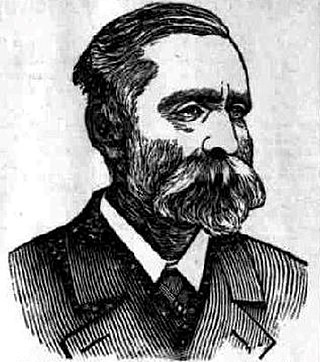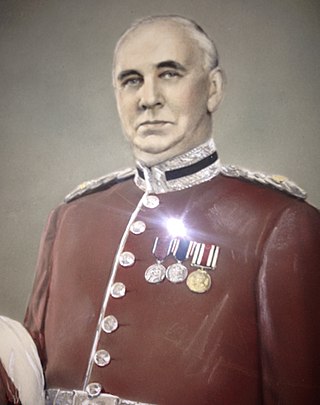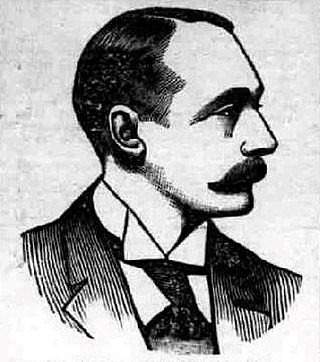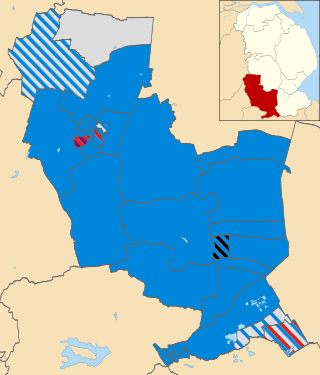Related Research Articles

The Parts of Kesteven are a traditional division of Lincolnshire, England. This division had long had a separate county administration, along with the two other Parts of Lincolnshire, Lindsey and Holland.

South Kesteven is a local government district in Lincolnshire, England, forming part of the traditional Kesteven division of the county. Its council is based in Grantham. The district also includes the towns of Bourne, Market Deeping and Stamford, along with numerous villages and surrounding rural areas.
Sir Hugh Arthur Henry Cholmeley, 3rd Baronet, DL, JP was a British soldier, landowner, and Liberal politician.

Sir William Earle Welby-Gregory, 4th Baronet was a British Conservative Party politician.

Kesteven County Council was the county council of Kesteven, one of the three Parts of Lincolnshire in eastern England. It came into its powers on 1 April 1889 and was abolished on 31 March 1974. The county council was based at the County Offices in Sleaford. It was amalgamated with Holland County Council, Lindsey County Council and the county borough of Lincoln to form the new Lincolnshire County Council in 1974.

Sir Robert Pattinson, JP, DL was a British Liberal politician and businessman. Pattinson joined his family's railway contracting firm after finishing school and was quickly appointed to senior positions. In 1900, he became chairman of Ruskington Urban District Council and four years later joined Kesteven County Council, eventually becoming an alderman and serving as its chairman for 20 years between 1934 and his death in 1954. He chaired the Sleaford Liberal Association (1900–18) and was nominated as the party's representative for Sleaford shortly before World War I broke out. He contested Grantham unsuccessfully in 1918, but was returned for the seat in 1922, serving until he was defeated in the following year's general election. Several other unsuccessful attempts at a parliamentary career followed. He chaired several bodies responsible for maintaining Lincolnshire's waterways, served as a magistrate for Kesteven and Lindsey and sat as Lincolnshire's High Sheriff in 1941. Knighted in 1934, Pattinson died aged 82 in 1954 after several years of illness.
Colonel William Vere Reeve King-Fane was an English local politician, magistrate and landowner, who served as vice-chairman of Kesteven County Council and High Sheriff of Lincolnshire.

Sir Charles Glynne Earle Welby, 5th Baronet, was a British civil servant who became a Conservative Party politician. He sat in the House of Commons from 1900 to 1906, and then had a long career in local government in Lincolnshire.

Elections to Kesteven County Council were held on Saturday, 2 March 1946. Kesteven was one of three divisions of the historic county of Lincolnshire in England; it consisted of the ancient wapentakes of Aswardhurn, Aveland, Beltisloe, Boothby Graffoe, Flaxwell, Langoe, Loveden, Ness, and Winnibriggs and Threo. The Local Government Act 1888 established Kesteven as an administrative county, governed by a Council; elections were held every three years from 1889, until it was abolished by the Local Government Act 1972, which established Lincolnshire County Council in its place.

The first elections to Kesteven County Council were held on Thursday, 17 January 1889. Kesteven was one of three divisions of the historic county of Lincolnshire in England; it consisted of the ancient wapentakes of Aswardhurn, Aveland, Beltisloe, Boothby Graffoe, Flaxwell, Langoe, Loveden, Ness, and Winnibriggs and Threo. The Local Government Act 1888 established Kesteven as an administrative county, governed by a Council; elections were held every three years from 1889, until it was abolished by the Local Government Act 1972, which established Lincolnshire County Council in its place.

The third set of elections to Kesteven County Council were held on Thursday, 7 March 1895. Kesteven was one of three divisions of the historic county of Lincolnshire in England; it consisted of the ancient wapentakes of Aswardhurn, Aveland, Beltisloe, Boothby Graffoe, Flaxwell, Langoe, Loveden, Ness, and Winnibriggs and Threo. The Local Government Act 1888 established Kesteven as an administrative county, governed by a Council; elections were held every three years from 1889, until it was abolished by the Local Government Act 1972, which established Lincolnshire County Council in its place.

The 2015 South Kesteven District Council election took place on 7 May 2015 to elect members of South Kesteven District Council in Lincolnshire, England. The whole council was up for election after boundary changes reduced the number of seats by two. The Conservative party stayed in overall control of the council.

The fifth set of elections to Kesteven County Council were held on Thursday, 7 March 1901. Kesteven was one of three divisions of the historic county of Lincolnshire in England; it consisted of the ancient wapentakes of Aswardhurn, Aveland, Beltisloe, Boothby Graffoe, Flaxwell, Langoe, Loveden, Ness, and Winnibriggs and Threo. The Local Government Act 1888 established Kesteven as an administrative county, governed by a Council; elections were held every three years from 1889, until it was abolished by the Local Government Act 1972, which established Lincolnshire County Council in its place.

Elections to Kesteven County Council were held on Saturday, 9 April 1949. Kesteven was one of three divisions of the historic county of Lincolnshire in England; it consisted of the ancient wapentakes of Aswardhurn, Aveland, Beltisloe, Boothby Graffoe, Flaxwell, Langoe, Loveden, Ness, and Winnibriggs and Threo. The Local Government Act 1888 established Kesteven as an administrative county, governed by a Council; elections were held every three years from 1889, until it was abolished by the Local Government Act 1972, which established Lincolnshire County Council in its place.

Elections to Kesteven County Council were held on Saturday, 5 March 1952. Kesteven was one of three divisions of the historic county of Lincolnshire in England; it consisted of the ancient wapentakes of Aswardhurn, Aveland, Beltisloe, Boothby Graffoe, Flaxwell, Langoe, Loveden, Ness, and Winnibriggs and Threo. The Local Government Act 1888 established Kesteven as an administrative county, governed by a Council; elections were held every three years from 1889, until it was abolished by the Local Government Act 1972, which established Lincolnshire County Council in its place.

Elections to Kesteven County Council were held on Saturday, 2 April 1955. Kesteven was one of three divisions of the historic county of Lincolnshire in England; it consisted of the ancient wapentakes of Aswardhurn, Aveland, Beltisloe, Boothby Graffoe, Flaxwell, Langoe, Loveden, Ness, and Winnibriggs and Threo. The Local Government Act 1888 established Kesteven as an administrative county, governed by a Council; elections were held every three years from 1889, until it was abolished by the Local Government Act 1972, which established Lincolnshire County Council in its place.

Elections to Kesteven County Council were held on Saturday, 6 March 1937. Kesteven was one of three divisions of the historic county of Lincolnshire in England; it consisted of the ancient wapentakes of Aswardhurn, Aveland, Beltisloe, Boothby Graffoe, Flaxwell, Langoe, Loveden, Ness, and Winnibriggs and Threo. The Local Government Act 1888 established Kesteven as an administrative county, governed by a Council; elections were held every three years from 1889, until it was abolished by the Local Government Act 1972, which established Lincolnshire County Council in its place.

Elections to Kesteven County Council were held on Saturday, 11 April 1964. Kesteven was one of three divisions of the historic county of Lincolnshire in England; it consisted of the ancient wapentakes of Aswardhurn, Aveland, Beltisloe, Boothby Graffoe, Flaxwell, Langoe, Loveden, Ness, and Winnibriggs and Threo. The Local Government Act 1888 established Kesteven as an administrative county, governed by a Council; elections were held every three years from 1889, until it was abolished by the Local Government Act 1972, which established Lincolnshire County Council in its place.
Francis Joseph Jenkinson, OBE, JP, frequently referred to in print as F. J. Jenkinson, and in person as Frank Jenkinson, was an English farmer, local politician and magistrate, who served as Chairman of Kesteven County Council and Chairman of the West Kesteven Rural District Council.
Emmeline Taylor, JP was an English local politician who served as the first female county councillor for Kesteven and that council's first female alderman; she was also one of the first women to be appointed a magistrate on the Sleaford Bench.
References
- 1 2 3 4 5 "Death of Mr. Valentine Stapleton", Grantham Journal, 22 July 1911, p. 6
- ↑ "Kesteven County Council: Result of the Poll" . Grantham Journal. 19 January 1889. p. 4. Retrieved 26 April 2015– via British Newspaper Archive.
- ↑ "Kesteven County Council: the first meeting", Grantham Journal, 2 February 1889, p. 4
- ↑ "Kesteven County Council", Lincolnshire Chronicle, 19 March 1895, p. 3
- ↑ "Kesteven County Council", Lincolnshire Chronicle, 19 March 1901, p. 3
- ↑ "Kesteven County Council", Grantham Journal, 16 March 1907, p. 3
- ↑ "Kesteven County Council", Sheffield Independent, 31 March 1904, p. 8
- ↑ "Kesteven County Council", Grantham Journal, 15 May 1909, p. 6
- ↑ "Lincolnshire Alderman's Will", Lincolnshire Chronicle, 5 August 1911, p. 4
- ↑ "Death of Mr. V. G. Stapleton of Stamford", Grantham Journal, 26 October 1929, p. 11